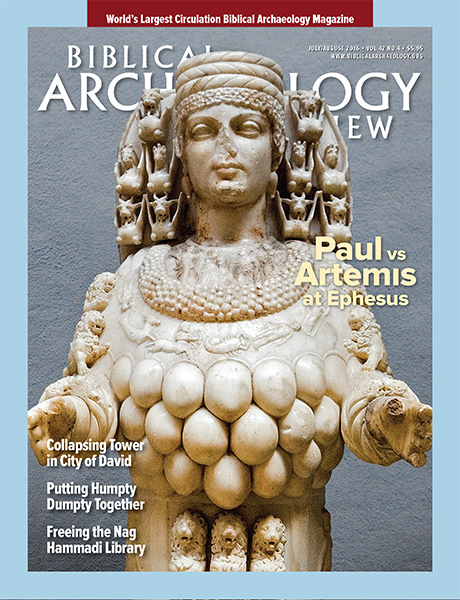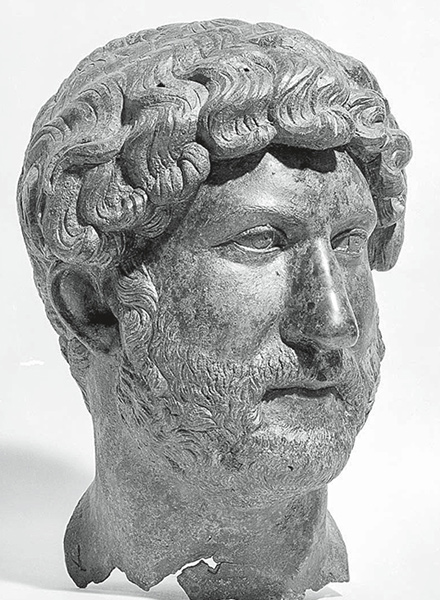
Archaeology Supporting the Bible
“Archaeology Gives New Reality to Paul’s Ephesus Riot” by James R. Edwards (BAR 42:04) is the best. The printed passage on the riot at Ephesus (Acts 19:23–41) was conveniently available. And the pictures, map and background all support the conclusion that “Luke knew what he was talking about in recording the riot in the theater.” It is wonderful to read an article that uses archaeology to support the Bible.
Centennial, Colorado
My Hat’s Off to Hershel
I just finished reading Hershel Shanks’s article on the ivory pomegranate and the authenticity of its inscription (“Ivory Pomegranate,” BAR 42:02). He and I are the same age (86), and I am in wonder at his determination, perspicacity and energy!
Fort Worth, Texas
Celebrating Ancient Synagogue Restoration
I just read Chaim Ben David’s article “Um el-Kanatir” (BAR 42:04) about the reconstruction of the ancient Um el-Kanatir synagogue. Bravo! It was great to see an ancient building restored in this way. Not only can science learn more about the past, but the public can get a deeper feel for antiquity and their connection to it. I hope this trend continues.
As the synagogue is now back together, more or less, are there any plans to conduct a service there, as a sort of re-dedication?
Wenatchee, Washington
Chaim Ben David responds:
According to Jewish halakhah (religious law), there is no need for rededication since a destroyed synagogue remains holy. Many public prayers have already been held in the rebuilt synagogue. My son’s bar mitzvah was celebrated there.
Spell Check Monster Rears Ugly Head
While certainly not a crime deserving imprisonment, I hope that Professor Dan Ben-Amos is not trying to stir up a new controversy with his repeated use of the word “penal” (see “From Eden to Ednah—Lilith in the Garden,” BAR 42:03) to refer to the hotly contested meaning of the Hebrew word tsela‘. His confusion of “penal,” which has to do with a penalty inflicted for a criminal act, with “penile,” which derives from the noun penis, is indeed disconcerting. But I believe it is the editors of BAR who deserve several lashes (with a wet noodle perhaps?) for not picking a bone with the author’s intended or not meaning and setting his house back in order by correcting the infraction.
Assistant Librarian
Reconstructionist Rabbinical College
Wyncote, Pennsylvania
The reference made in Dan Ben-Amos’s article to “penal” was an error. It should be “penile.”—Ed.
Not Offended So Far
In the past I’ve seen copies of BAR, but I have finally gotten ’round to being a subscriber, and so far you’ve managed to stimulate rather than offend. Thank you.
Modi’in, Israel
Hadrian Restored and Revealed

A recent Israel Museum exhibit on the Roman emperor Hadrian included three stunning bronze statues of Hadrian (see Strata: “Hadrian’s Many Faces,” BAR 42:04). One of them (pictured as the center of three) was actually discovered more than 40 years ago in Israel by an American tourist, Morton Leventhal, while he was using a metal detector to search for ancient coins.


Mr. Leventhal lives in our community. I know it would be appreciated by Mr. Leventhal, his family and the community if his contribution to the Hadrian discovery were acknowledged in BAR.
New York, New York
We hope Mr. Leventhal, his family and the community enjoy this recognition, although Mr. Leventhal’s activity was illegal.
In 1978, we wanted to put a color picture of this Hadrian on BAR’s cover. But the Israel Antiquities Department refused to release a color picture of the statue (nor would it allow us to take a color picture of it) because it had not yet appeared in a scholarly journal (see “Editorial: Free Hadrian,” BAR 04:03). The widespread protest of BAR readers was unable to reverse the decision. Of course that would not be the case today; the pictures would be readily available from the Israel Antiquities Authority.—Ed.
Greenspoon Column
Leonard Greenspoon’s July/August column, “The Bible in the News: Methusaleh & Co.,” refers to the lyrics for “It Ain’t Necessarily So” by George Gershwin. The lyrics were written by his brother, Ira Gershwin.

